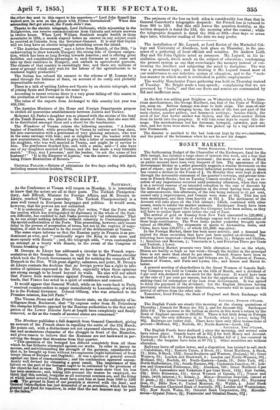The Honiteur publishes a full despatch from General Canrobert, giving
an account of the French share in repelling the sortie of the 22d March, He points eat, with a distinctness not yet expressed elsewhere, the pecu- liar and momentous character of the struggle in front of the Mamelon, and gives reason to believe that the Russians are not backward in per- ceiving the danger that threatens from that quarter. "This operation of the besieged has differed completely from all those which he has hitherto attempted against our works. In order to insure its success, and notwithstanding the strength of the garrison, considerable as that is, he brought up from without two regiments (eight battalions) of fresh troops (those of Dnieper and Ouglitch). It was a species of general assault against our lines of communication ; and the combination appeared uncom- monly well devised for obtaining s great result. The importance of this failure on the part of the besieged ought to be estimated by the greatness of the object he had in view. The prisoners we have made state that his loss has been enormous ; and, taking into account the masses he employed, we think that this combat, irregular as all nocturnal combats are, and the firing at which lasted several hours, must have cost him at least from 1000 to 1200 mell The ground in front of our parallels is strewed with the dead ; and General Osten-Sacken has just demanded of us an armistice, which has been granted and fixed for tomorrow, in order that the last ,honours may be paid to the fallen." The estimate of the loss on both sides is considerably less than that in General Canrobert's telegraphic despatch : the french loss is reduced to from 300 to 320. But this still leaves the question doubtful, as the written despatch is dated the 23d, the morning after the combat ; while the telegraphic despatch is dated the 26th or 29th—four days or seven days later, whichever reading of the date we may prefer.


























 Previous page
Previous page